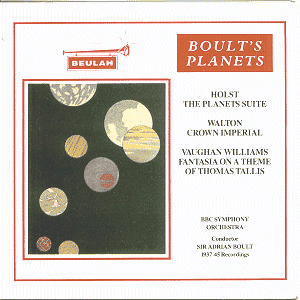HOLST: Suite, The Planets*;
WALTON: March, Crown Imperial**;
VAUGHAN
WILLIAMS: Fantasia on a Theme by Thomas
Tallis***.
 BBC SO/Sir Adrian Boult
BBC SO/Sir Adrian Boult
Recorded: * January, 1945 ** April, 1937 *** April, 1940
 BEULAH 2PD12
[69.35]
BEULAH 2PD12
[69.35]
Beulah
This and all remaining Beulah stock is being sold at half-price as
the label is being discontinued

It was Sir Adrian who, in Holst's felicitous phrase, "first caused The Planets
to shine in public" when he gave the first (private) performance of the work
in 1918. As the highly informative notes accompanying this CD remind us this
came about when Balfour Gardiner, in a most gracious gesture from one composer
to another, hired the Queen's Hall and its orchestra. This was so that Holst
could hear a performance of his largest work to date before departing for
war service. Boult was chosen to conduct, thereby beginning a life-long
association with this work, which he recorded no less than five times.
This present performance is the first of these. It was made at the Corn Exchange
in Bedford. By 1945 this was a familiar venue for Boult and his orchestra.
On the outbreak of war they were evacuated to Bristol and later, in July
1941, to Bedford where they remained for the duration. Towards the end of
the war Walter Legge and HMV made several recordings in Bedford with Boult
and the BBCSO.
Michael Kennedy, in his definitive biography of Boult, quotes the conductor's
view that the Corn Exchange was "a reasonably good studio, but a rather
overpowering concert hall". To judge by the evidence of the Elgar recording
mentioned above and this account of The Planets it was quite a reasonable
recording venue. There appears to be a good amount of space around the sound
and the engineers captured well the sound of Holst's huge orchestra at climaxes
(this must have been quite a challenge at the time). Inevitably, there is
some distortion in places and, with two sets of timpani to contend with,
some bass boom is apparent at times. Overall, however, the sound picture
is excellent with plenty of detail registering (for example, the harps and
celesta 'tell' in 'Neptune'.)
Beulah's transfer is a good one. There is some surface hiss from the 78s
but it never distracts. To a large degree this is due to the quality of the
performance. Though wartime call-ups had deprived the BBCSO of many of the
players who had graced its ranks in the 1930s this performance shows that
it remained a fine orchestra. The playing is very fine throughout. As for
Boult, his interpretation simply seems 'right'. Under his baton the music
is allowed to breathe and speak for itself (the "big tune" in 'Jupiter' is
given with simple eloquence and is all the better for it.)
The recording of the Tallis Fantasia, also Boult's first, was made
in the BBCSO's previous wartime home, the Colston Hall in Bristol. Again,
the producer was Walter Legge. Here, the surface noise is a little more prominent
but is not at such a level to spoil the listener's enjoyment.
What does come through very clearly is the quality of the BBCSO's strings.
The tone is full and rich and the players respond eloquently to Boult's unfussy
direction. The contrasts between the three groups of players are well observed
by performers and engineers alike. It is fascinating to compare this performance
with Boult's last recording of the piece which he made in 1975 with the LPO,
also for HMV. In the earlier recording accents are more sharply observed
and there seems a greater degree of urgency (the 1975 account is the longer
by over two minutes). Both, however, are supremely authoritative.
To complete the disc Beulah include the first-ever recording of Walton's
splendid march, Crown Imperial, newly written for the coronation of
King George VI. Boult conducted the piece at the ceremony itself (and, indeed,
at the coronation of our present Queen) and made this studio recording a
few weeks earlier.
What a splendid march it is, and how well Boult and his players perform it!
Nowadays, Crown Imperial is very familiar fare but when this recording
was made it was "hot off the presses" and what we have here is, effectively,
its première. It is played with tremendous (but not excessive) swagger.
Of course, the recording is not as full and rich as would be the case today.
However, in a way that brings compensations. For example, the placing of
the microphones and the comparative lack of depth of the recorded sound means
that many of the exciting swirls for the violins and high woodwinds, which
are such an important part of Walton's orchestration 'tell' a bit more than
we often hear nowadays. There is, above all, a feeling of excitement, no
doubt occasioned both by the music itself and by the anticipation of the
event for which it had been written.
A splendid and important issue. Top-drawer performances captured in sound
which is really quite excellent for the period. The well-researched notes
are ideal for an 'historic' issue for they place the performances in their
historical context. This is an essential purchase for admirers of Sir Adrian
and for lovers of English music. The recordings capture him in his prime
performing music for which he had an especial affinity. They also give us
a vivid illustration of the magnificent orchestra which he created from scratch.
Enthusiastically recommended.
John Quinn
See also Holst :The Planets by Len
Mullenger

